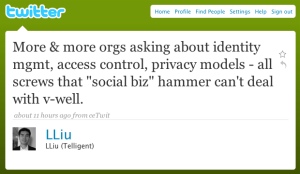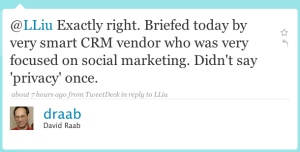From today's tweets...
For the past three decades, if not longer, privacy advocates have been worried about the possibility that large corporations could use CRM software to build dossiers on customers that rival J. Edgar Hoover's background files. What happens to the knowledge that a hotel clerk adds to your frequent stay membership files? Can a credit card company hope to derive insight from the unique combination of shops that you visit? Most importantly, will companies make assumptions about you based on coincidences, or can profiles really help marketers understand their prospects?
The latter question is what concerns critics of "social marketing," a practice that uses CRM software and the latest social media to reach new customers. On my Facebook profile, I may list myself as a "fan" of a certain hoagie shop. What I don't know is whether that hoagie shop will use my image to market to my friends. It's already happening on Facebook, and some marketers are experimenting with reaching out through text messages and Twitter. Americans may love to share a little too much personal information on their social networks, but they hate it when third parties use that information against them.
According to some experts, using social media ineffectively generates privacy concerns because data is incomplete or inaccurate. When customers and prospects self-select information, marketers can end up chasing leads that have no interest at all in their products and services. It's just as bad as the classic technique of forcing customers to write down the names of five friends as referrals -- with incomplete or unrefined data, customers will often choose the first people they can think of instead of the likeliest candidates for sales calls. Likewise, social CRM software that doesn't distinguish between deep and casual relationships can shotgun ads to confused acquaintances, hurting brand perception.
Instead, marketing professionals recommend using CRM systems at the hub of campaigns to cultivate customer loyalty. By allowing customers to reach out directly, social marketing programs give customers control over their own privacy. In addition, when customers are more highly motivated to talk about a product or service, their recommendations are perceived as being genuine and valid. Instead of worrying about buying CRM software that can automate "viral" campaigns, marketers should look for CRM systems that moderate social discussion and referrals.



No comments:
Post a Comment